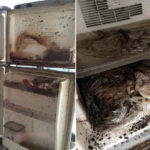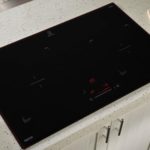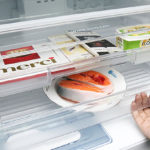Boiled eggs are a common and easy-to-prepare dish, but you may sometimes encounter the issue of cracked shells and seeping egg whites during the boiling process. This is a fairly common problem that can affect the quality and aesthetics of the dish. So, what causes this phenomenon, and how can it be prevented? Let’s explore the details in the article below.
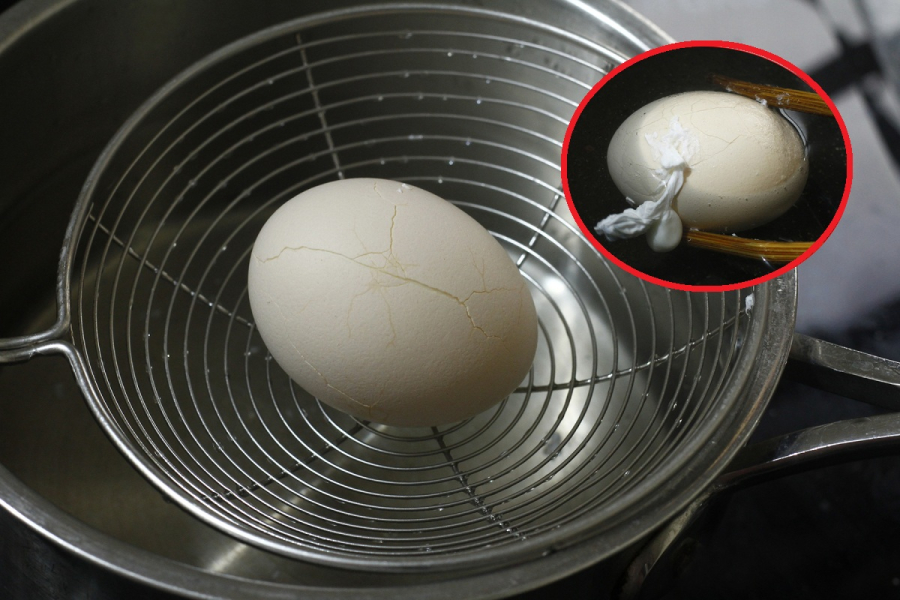
Egg with a Seeping White
1. Causes of Cracked Egg Shells During Boiling
1.1. Sudden Temperature Changes
When eggs are placed in cold water and then brought to a boil, or if they are transferred directly from a cold environment to boiling water, the sudden change in temperature can cause cracks in the shell. As the temperature rises rapidly, the air inside the egg expands, creating pressure within the shell, which can lead to cracking.
1.2. Thin or Damaged Egg Shells
Egg shells not only protect the egg white and yolk but also keep them from leaking out. If the shell is too thin or has a small crack beforehand, its ability to withstand pressure during boiling is reduced, making it more prone to cracking.
1.3. Gas Accumulation
During the boiling process, gas can accumulate inside the egg and create pressure. Especially if the eggs are not allowed to come to room temperature before boiling, this gas will have difficulty escaping and will exert pressure on the shell, leading to cracks.
2. Causes of Seeping Egg Whites
2.1. Cracked Shells Leading to Leaks
When an egg shell cracks, the white can leak out. As the water temperature rises, the egg white will transform from a liquid to a solid state, and if the shell is already cracked, the white will seep out into the water.
2.2. Improper Boiling Techniques
Boiling eggs at too high a temperature or leaving them in boiling water for too long can cause the egg white to separate from the yolk and leak out. Vigorous boiling can create pressure on the shell, causing it to crack and the white to seep out.
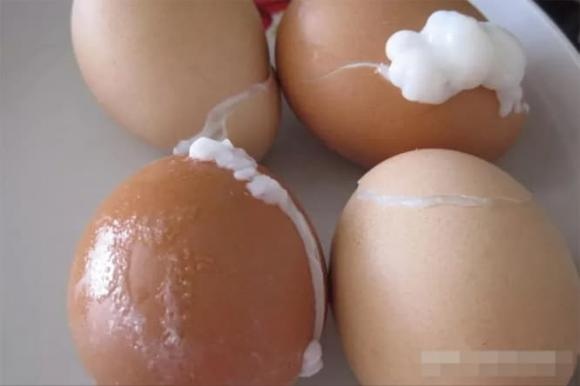
Boiling Eggs
3. Prevention and Solutions
3.1. Place Eggs in Hot Water
To avoid cracked shells, start by placing the eggs in a pot and adding cold water until the eggs are submerged by about 1-2 cm. Then, slowly heat the water, allowing the water and eggs to warm up together, reducing the risk of sudden temperature changes.
3.2. Add Salt or Vinegar
Adding a small amount of salt or vinegar to the boiling water can help strengthen the egg shells and reduce the likelihood of cracking. Salt or vinegar can cause the egg white to coagulate more quickly in case of a leak, minimizing seepage.
3.3. Allow Eggs to Come to Room Temperature
Before boiling, let the eggs sit at room temperature for at least 10-15 minutes. This helps reduce sudden temperature changes and decreases the chance of shell cracking during boiling.
3.4. Use Proper Boiling Techniques
Boil eggs at a moderate temperature and avoid vigorous boiling. Use low heat to achieve a gentle boil, which will reduce the pressure on the shells and minimize cracking.
4. Benefits of Understanding Cracked Shells and Seeping Egg Whites
4.1. Improved Dish Quality
By understanding the causes and solutions for cracked shells and seeping egg whites, you can enhance the quality of your boiled eggs. Intact and leak-free boiled eggs will make your dish more appealing.
4.2. Time and Effort Savings
Knowing how to prevent issues related to boiling eggs saves you time and effort in the cooking process. This is especially important when preparing meals for your family or a special event.
Conclusion
While cracked shells and seeping egg whites can be frustrating and impact the quality of your dish, understanding the causes and implementing preventive measures can help you achieve perfectly boiled eggs. By adjusting temperatures, using appropriate boiling techniques, and paying attention to egg quality, you’ll be able to produce beautiful and delicious boiled eggs.
Analyzing Distinctions Between Covid-19 and Seasonal Flu Respiratory Illnesses
Have you been feeling under the weather lately? It might be difficult to tell whether it’s Covid-19 or flu symptoms you are experiencing. Fortunately, there are a few identifying factors that can help us differentiate between these illnesses. In this article, we’ll discuss the key differences between Covid-19 and seasonal flu.
























